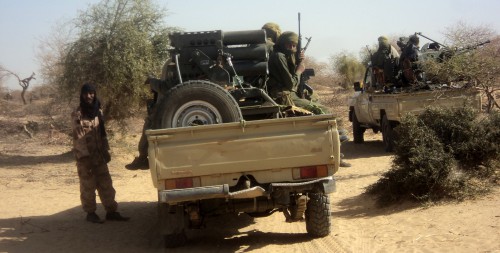The crisis in Mali, which has attracted considerable attention in the past few weeks, has illustrated signs of progression. This has not been without recognition of a difficult path ahead in achieving sovereignty from the Islamist militants. The crisis has gone from thoughts of an imminent Islamist militant takeover of one of West Africa’s most respected democracies, to refuge upheld by French morale and military, to ensuing eradication of the unwelcome extremists from Mali. This whirlwind of events has settled to an extent and it has been stated that French forces will hand the towel to the Malian army and head back to Europe by March.
As previously stated in the Suffolk Journal, some students on campus have not been immune to this distress. Suffolk student from Mali, Dauda Wague, had family in a town that was briefly seized by the Islamist militants, but thankfully he has finally contacted his family who “are safe and happy that nothing happened. The network in the town was not repaired for a while,” Wague stated, but eventually they got in contact.
“The Islamists in my family’s town,” said Wague, “came to avoid bombing by the French. The Islamists did not fit in in the town, they just came and bought what they wanted, did not steal anything or talk to anyone.”
According to Wague, the Islamist militants have been able to hide in the north, because they are amongst populations speaking the same language and of similar appearance. In many instances, the French military has easily taken over towns in Northern Mali because the militants are covered for by their families or people associated with the cause; or they camp out just beyond the towns’ limits.
“The Islamist extremists knew the French were coming,” said Wague. Therefore, the militants either fled or dissociated with any militaristic motivation.
This is the current issue facing the city of Gao, in Northern Mali, at the moment. Fire has been exchanged for a few days now, forcing the French to come back and support the Malian army. The militants blend in and make it difficult to tell who is or is not an enemy.
Fortunately, the Islamist extremists, who were well armed with runoff from the regime backing Muammar Gaddafi in Libya, have been forced into the depths of the desert and mountains in the North. For both the Malian and French militaries, the potential of guerilla-style-fighting style has surfaced feelings nothing short of trepidation. This discreet and ruthless fighting method, which led to the unremitting and arduous demise of the U.S. campaign in Korea in 1950, could draw out a much longer and indecisive battle.
To further complicate Mali’s already trying state of affairs, issues within the Malian military itself have surfaced. According to Reuters, paratroopers who were “loyal to deposed President Amadou Toumani Toure,” were fired upon in their home, killing and wounding citizens. This event, which occurred in Mali’s capital, Bamako, speaks to the instability and security fears the country is facing. Toure was the president ousted via military coup in 2012 which led to the initial takeover by the Tuareg rebels in Northern Mali, according to Reuters.
Recent attacks in the Northern area of Mali have included a suicide bombing at a checkpoint, merely wounding one soldier at the station. This wide-ranging instability around Mali has the potential to digress the efforts taken by France. Cohesive policy and recognition, according to Reuters, will need to play a role in the success of a prosperous and civil Mali in the future.
Dauda Wague has expressed concerns for the future of Mali with a simple and vivid declaration. “It’s really scary,” he says. The war has not seen its end and it is very uncertain how it will play out. In terms of the French role, Wague suggested that “You cannot say that you don’t support what France is doing, but the future prove hard because without France, the terrorists will take over.”
The role France has played has been convoluted and contradictory according to Wague. It is a “tragedy,” Wague said, “that France lit the fire and are now playing the fireman.” He is speaking to the overarching theme of how France initially, under President Sarkozy’s rule, supported the Tuareg revolution in the North of Mali and eventually gave Algeria the go-ahead on allowing fighters in the rebellion against Gaddafi to cross their border freely into Mali.
Furthermore, the future is uncertain according to Wague because of the wide-ranging economic issues facing the country. Ever since the coup d ‘etat that ousted President Toule, the Economic Community of West African States (ECOWAS) initiated an embargo on Mali which forced many large investors to pull out of the country. Moreover, wartime in any country proves devastating on local business, and Wague is unsure about their ability to rebound without the flow of capital that investors previously supplied.
The atmosphere in Mali has shown signs of recovery and stabilizing with recent efforts focused only in the Northern desert area of Mali, but the lingering effects of the conflict do not promote such an optimistic view. From business volatility to insecure allegiances, Mali has a long way to go before their formerly admirable democracy shows signs of reform and progress toward a secure and developing society.














Ryan Powell • Feb 14, 2013 at 6:07 pm
New article of mine: Suffolk student comments on waning crisis in Mali http://t.co/dzzQolK4
The Suffolk Journal • Feb 13, 2013 at 5:45 pm
[International] Suffolk student comments on waning crisis in Mali: http://t.co/JtwGBIUy